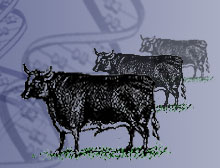In the US they want to hitch the wagon before the cows and pigs
Avi Blizovsky

"There is no evidence that meat or milk from cloned healthy farm animals could harm humans," said a statement from the American Food and Drug Administration in the first attempt to answer questions related to new technologies.
"The announcement does not mean that Americans will be eating duplicate food for the foreseeable future," says Dr. Stephen Sandloff, the FDA's chief veterinary expert.
The FDA is seeking public feedback on its assessment of cloning's impact on the food supply before it decides whether a cloned animal will require government approval before it can be sold as food — a decision expected to be made next year.
In the meantime, the food industry has agreed not to allow products from cloned animals to enter the food supply, a ban that should continue until a final decision is made.
The agency asked the National Research Council to study food made from cloned animals. The council, an independent group that advises the government on scientific issues, concluded that cloned meat and other products appear safe.
The FDA will have to examine two things: whether the animals themselves are healthy and whether nutritionally there is no difference between the product in question and an identical product from non-reproduced animals. "By definition, a cloned animal should not be different from the original animal whose DNA was used in the process.
However, the technology is still not perfect. From many reproduction attempts, one animal is created and many of those born suffer from defects. The FDA expressed concern for the welfare of the animals in an 11-page summary in an internal report that should be uploaded to the agency's website.
"The frequency of giving birth to healthy women is low, although the situation seems to be improving as the technology improves," the report concluded.
"Still, birth defects are no different from problems that occur in the first few days of any assisted-birth animal," the FDA said. "When the animal is born healthy, there are small differences between cloned and non-cloned animals at a young age, but as the animal matures, it is impossible to differentiate between them." Sandloff said.
If it comes to the conclusion that the food products are safe, the agency must determine whether cloning is just another way of helping the stock on the farm - something that does not require regulation - or whether each product will require approval before sale.
Even though these are preliminary recommendations, consumer factors in the US are concerned. "The FDA has not yet completed writing the 300-page scientific review on which the summary is based, although the FDA is consulting with scientific advisors to review the risk assessment. How, critics argue, can anyone trust the FDA to review such an important issue based on an 11-page summary of vague information? Additionally, did the FDA not consider the public backlash of using cloned animals for food, something the National Science Council specifically warned against?” asks Carol Tucker Furman of the Consumer Federation of America.
"Also, it is not certain that the FDA has the authority to stop manufacturers of duplicate food, if there are any, from breaking the time limit and selling duplicate products." saying.
Consumer response may provide a key condition as to whether or not food manufacturers will invest in replication technologies. Genetically modified food suffers from problems and export restrictions despite the FDA's assurance that the food sold is safe. While replication means genetic copy, not genetic modification, the public's understanding of biotechnology is superficial.
"If these products are safe, can the consumer be calm?" asks Stephanie Childs of the Food and Grocery Manufacturers Association of America. "We are looking into this question closely."
For news on CNN
